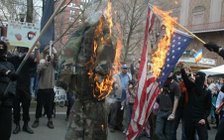
If you find her, send her my way
Nothing to see here, keep moving along

(Newser) – Despite his stated desire to the contrary, President Bush and his most hawkish aides are determined to keep prison facilities operating at Guantánamo Bay, reports the New York Times. Bush made up his mind following a Supreme Court ruling in the summer granting 250 detainees the right to challenge their incarceration, and never seriously considered State Department or Pentagon proposals to shut down prison operations, according to sources.
Gulag (from the Russian ГУЛАГ: Главное Управление Исправительно— Трудовых Лагерей, "Glavnoye Upravleniye Ispravitelno-trudovykh Lagerey", "The Chief Directorate of Corrective Labor Camps") was the branch of the Soviet internal police and security service that operated the penal system of forced labor camps. While these camps were intended for criminals of all types, the Gulag system has become primarily known as a means of repression of political opponents of the Soviet state.

A colloquial name for a Soviet Gulag inmate was "zeka", "zek". In Russian language, "inmate", "incarcerated" is "заключённый", zaklyuchonny, usually abbreviated to 'з/к' in paperwork, pronounced as 'зэка' (zeh-KA), gradually transformed into 'зэк' and to 'зек'. "zaklyuchonny kanalostroitel'" (incarcerated canal-builder), originating to the Volga-Don Canal slave workforce members. Later the term was backronymed to mean just "zaklyuchonny". sharashka (шарашка, the goofing-off place) were in fact secret research laboratories, where the arrested and convicted scientists, some of them prominent, were anonymously developing new technologies, and also conducting basic research. Psikhushka (психушка, the nut house), the forced medical treatment in psychiatric imprisonment was used, in lieu of camps, to isolate and break down political prisoners. Special camps or zones for children (Gulag jargon: "малолетки", maloletki, underaged), for disabled (in Spassk ), and for mothers ("мамки", mamki) with babies. These categories were considered as not producing any useful outcome and often subjected to more abuse. Camps for "wifes of traitors of Motherland" (there was a special category of repressed: " Traitor of Motherland Family Member" (ЧСИР, член семьи изменника Родины)).


Hiroshima and Nagasaki are often used as a shorthand term for war crimes. That is not how they were judged at the time. Our side did terrible things to avoid a more terrible outcome. The bomb was a deliverance for American troops, for prisoners and slave labourers, for those dying of hunger and maltreatment throughout the Japanese empire - and for Japan itself. One of Japan's highest wartime officials, Kido Koichi, later testified that in his view the August surrender prevented 20 million Japanese casualties. The destruction of two cities, and the suffering it caused for decades afterwards, cannot but temper our view of the Pacific war. Yet we can conclude with a high degree of probability that abjuring the bomb would have caused greater suffering still

The Second Day of July 1776, will be the most memorable Epocha, in the History of America. I am apt to believe that it will be celebrated, by succeeding Generations, as the great anniversary Festival. It ought to be commemorated, as the Day of Deliverance by solemn Acts of Devotion to God Almighty. It ought to be solemnized with Pomp and Parade, with Shews, Games, Sports, Guns, Bells, Bonfires and Illuminations from one End of this Continent to the other from this Time forward forever more. You will think me transported with Enthusiasm but I am not. I am well aware of the Toil and Blood and Treasure, that it will cost Us to maintain this Declaration, and support and defend these States. Yet through all the Gloom I can see the Rays of ravishing Light and Glory. I can see that the End is more than worth all the Means. And that Posterity will tryumph in that Days Transaction, even altho We should rue it, which I trust in God We shall not.
(The Book of Abigail and John: Selected Letters of the Adams Family, 1762-1784, Harvard University Press, 1975, 142). tip to James R. Heintze.
A funny little note,
Independence Day Should Have Been July 2 –July 2, 1776 is the day that the Continental Congress actually voted for independence. John Adams, in his writings, even noted that July 2 would be remembered in the annals of American history and would be marked with fireworks and celebrations. The written Declaration of Independence was dated July 4 but wasn't actually signed until August 2. Fifty-six delegates eventually signed the document, although all were not present on that day in August.


